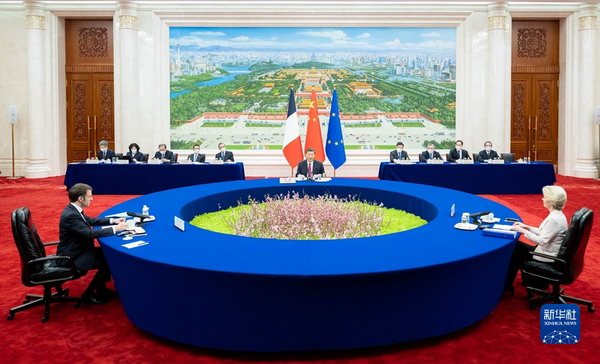
In a span of less than a week, Xi Jinping receives an official visit from France, the European Union and Brazil, two important states and one of the largest communities on the international scene. The former matters for its place in the structure of world politics (a seat on the UN Security Council and its nuclear arsenal). The second, for its territorial and demographic dimensions, but above all for its role as leader of the so-called global South. More than a coincidence, the symbology of the meetings is that of a new center of world power. And the struggle to get a share of this emerging new order. In addition to signing new contracts for French companies, the balance of Macron’s trip varies between nothing and failure for different analysts in the country. Lula is in a better position.
Marc Julienne, a researcher at the IFRI (French Institute of International Relations), is one of the analysts who saw a diplomatic failure. One of the biggest mistakes, in his opinion, was putting the Ukrainian War at the top of his agenda.
“It was illusory to look to Beijing for a solution to the war. All analysts were unanimous in saying that Emmanuel Macron would get nothing. Xi Jinping has no interest in finding a political solution to this conflict, just as he has no interest in supporting Vladimir Putin militarily,” he said in an interview with Franceinfo radio.
Macron has been trying to project himself as a world leader for more than a while, read the visit he made to Putin on the eve of the Ukraine War. Now, as soon as it leaves China, Beijing surrounds and increases the intimidation of Taiwan. It is even worth asking whether his visits are not, in fact, counterproductive, generating above all the opposite effect of what was expected.
European Commission President Ursula Von Der Leyen’s demanding tone towards Xi did not help. In the editorial “A difficult but necessary dialogue”, Le Monde still considers it a good idea.
“Besides, he is more comfortable, in front of the Chinese leaders, representing 450 million inhabitants than 68 million, commercial relations refer to the European Union”, analyzes the newspaper with the largest circulation in France.
“Despite the discomfort and the lack of concrete results, Macron and von der Leyen were right to relaunch, together, an indispensable dialogue with China. This relationship must be maintained, on condition that they remain lucid and demanding”.
Macron wanted to add a European dimension to his visit, in defense of the concept of “strategic autonomy”. The French State advocates a Europe with self-defense and, therefore, a decrease in dependence on the United States.
Historically, France has presented itself as a country not aligned with the US. But it doesn’t convince. “It’s easier to tell them the truth because they are our allies. The problem is that the French president doesn’t do the same with China. You have to be frank, or even severe with Beijing. Disagreements should not be brushed under the rug”, says Marc Julienne.
Macron tries to do the tightrope walker. Treats Putin by informal pronouns. He provokes an outcry in eastern Europe (largely hostile to the Russian state) by saying that one should not humiliate Russia amidst the war in Ukraine.
He says in an interview with the Politico website that France cannot be an automatic follower of the United States. “The paradox would be that, to overcome the panic, we believe that we are just followers of the United States”.
“The question Europeans must answer is… is it in our interest to accelerate (the crisis) in Taiwan? No. The worst thing would be to think that we Europeans have to become followers on this issue and make our own the US agenda and an overreaction to China.”
Brazil under Lula
In the balance between belligerent states, France is the state that comes closest to the vision of Brazil under Lula, even though the latter seems to be in a better position.
Lula represents a great country, but also the most powerful of a trading bloc. And it has a less challenging mission in relation to China than the European Commission: to reinsert Brazil in the international scenario. And on the contrary, a concrete project of greater integration: the Banco dos Brics, or NBK, no less than under the presidency of Dilma Rousseff.
China has a vision of the world, in which it is the dominant one, and the global South is its instrument of legitimation. Making use of Brazil’s support seems to be the icing on the cake, especially with the country’s return to diplomacy and the global scene.
In the tradition of neutrality, as France seeks in a certain way to present through the notion of non-alignment, Brazil can be more equidistant than France, even though it signals greater proximity to Beijing.
Celso Amorim’s most recent visit to Moscow indicated that Russia’s interest in peace was illusory, a state that Brazil is not going to challenge either. A bath of realism that Lula takes before traveling.
A favorable timing for Lula, almost like an alignment of planets for a symbolically more fruitful trip to Brazil.
On his agenda as Brazil’s new president, the United States came first. In China, it will stay longer. He will have a bigger role as a global actor. It will be up to the wisdom of the balance between humility and pride so as not to position itself as a submissive nation (neither to China nor to any State), but one that wants to architect and lead a new world.
Source: https://www.diariodocentrodomundo.com.br/macron-tenta-mostrar-a-xi-nao-alinhamento-com-eua-lula-esta-em-melhor-posicao/

